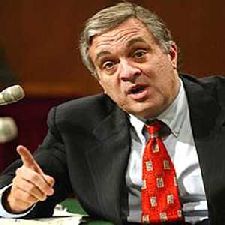Tenet Accused of Lying in Memoirs:
Former CIA Chief Claims He Nixed Deal to Free Jonathan Pollard,
By Aaron Klein (WorldNetDaily.com – May 4, 2007)


“Clinton’s pledge to free Pollard was not a personal promise made to a particular prime minister. … This was a promise made to the state of Israel and to the people of Israel.”
As reported on this blog last week, WorldNetDaily.com’s Jerusalem editor Aaron Klein now reports;
Excerpts;
Former CIA Director George Tenet’s claim that he is responsible for nixing a deal to free imprisoned Israeli spy Jonathan Pollard has been contradicted by a number of sources, including some who say Tenet personally told them otherwise.
According to Netanyahu and former Israeli Cabinet Secretary Dan Naveh, as well as public on-record statements of key Wye participants, Pollard’s promised release was as an integral part of Israel’s signing the accords.
Tenet writes he told Clinton he would resign if Pollard were freed, explaining his personal prestige would be damaged since his CIA colleagues would assume he helped to broker the deal.
“If Pollard was in the final package deal, no one at CIA headquarters would believe I had nothing to do with it,” wrote Tenet in his memoirs.
He wrote his career would be “destroyed” if he agreed to the release of Pollard.
But Malcolm Hoenlein, executive vice president of the Conference of Presidents of Major American Jewish Organizations, previously told media he received a phone call from Tenet immediately after the Wye deal was signed in which Tenet denied he had ever threatened to resign if Pollard were freed.
“He truly was very emotional and very upset about it,” Hoenlein said. “He said that was not the way he did things, and from our experience, that was not the way he did things”: Hoenlein
“[Pollard’s release] would be a huge payoff [for Israel]; you don’t have many like it in your pocket … You will need it later, don’t use it now”: Dennis Ross
Tenet’s version of events are also contradicted by former U.S. envoy to the Middle East Dennis Ross, who played a key role in Israeli-Palestinian negotiations in which Pollard’s release was reportedly pledged.
In his book, “The Missing Peace,” Ross writes that at the Wye summit, Clinton asked him if freeing Pollard would be important to Israel.
“Yes,” Ross writes he replied, “because he is considered a soldier for Israel, and there is an ethos in Israel that you never leave a soldier behind in the field.”
But Ross writes he cautioned the president against releasing Pollard until greater concessions from Israel could be secured during final status talks.
“[Pollard’s release] would be a huge payoff [for Israel]; you don’t have many like it in your pocket … You will need it later, don’t use it now,” writes Ross.
Israeli sources close to the Wye Accords told WND Clinton took Ross’ advice but needed an excuse to break his promise to free Pollard. The sources claim Clinton orchestrated Tenet’s threat to resign, which became a plausible explanation for not releasing Pollard.
Naveh, who was a high-ranking Israeli official at Wye, said Clinton’s pledge to free Pollard was not a personal promise made to a particular prime minister. … This was a promise made to the state of Israel and to the people of Israel.”
Larry Dub, Pollard’s Jerusalem attorney, called Clinton’s pledge at Wye “binding upon successive administrations until fulfilled.”
‘Twenty-two years in prison is a long time’
“…. The only thing that is relevant now is that the on-going injustice – holding me in prison because I am regarded as a high value bargaining chip – be addressed and rectified without any further delay.”
From his prison cell in Butner, N.C., Jonathan Pollard relayed his response to Tenet’s book to WND: “A decade has passed since Wye. Ross has publicly called for my release in recent months; so has former head of the CIA James Woolsey. Twenty-two years in prison is a long time.
“…. The only thing that is relevant now is that the on-going injustice – holding me in prison because I am regarded as a high value bargaining chip – be addressed and rectified without any further delay.
“My release ought to be a matter of principle – of justice and of due process – and it ought to reflect the honor and integrity of the U.S.-Israel special relationship. Israel has already paid for my release at Wye. It is time to collect it.”
1 thought on “Tenet: Clinton’s Excuse Not to Free Pollard”
Comments are closed.